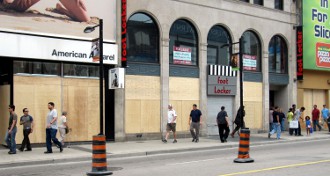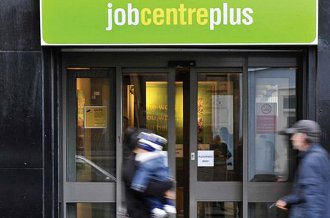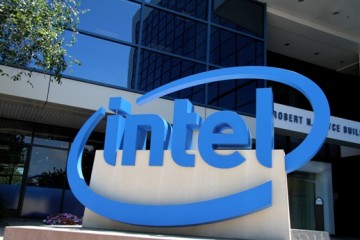 As retailers moved to ditch pricey high street property and weather the storm somewhere cheaper, many town centres started resembling recession ghost towns, but not for long. According to the latest figures from the Local Data Company, the overall store vacancy rate fell to 14.1 percent, from 14.2 percent in February.
As retailers moved to ditch pricey high street property and weather the storm somewhere cheaper, many town centres started resembling recession ghost towns, but not for long. According to the latest figures from the Local Data Company, the overall store vacancy rate fell to 14.1 percent, from 14.2 percent in February.
Tag: vacancies
High Street headed to gambling “ghetto”
 Betting shops and payday lenders could rule the high street roost if new legislation comes into place.
Betting shops and payday lenders could rule the high street roost if new legislation comes into place.
The warnings from the Local Government Association (LGA) as new rules, which came into place yesterday, stipulate that some premises don’t have to apply for permission to change what they supply for up to two years.
It means that premises previously used as independent gift shops could be turned into payday loan companies while greengrocers could become betting shops, without the need for planning permission or public consultation.
The government said it had made the decision as it felt it would help boost economic growth and bring boarded-up shops back into use. However the LGA said that it felt it would do the opposite and instead lead to more high streets being over-run with clusters of betting shops and payday loan companies.
The association also pointed out that the new rules would also allow almost any buildings to be temporarily turned into new free schools with no public consultation or planning permission. And in many parts of the country, developers will be given free rein to convert offices into flats without planning consent.
It said that the government had to rethink its plans and instead look at rejuvenating the highstreet by encouraging the opening of businesses that residents wanted there. It said the new rules would make this method harder.
Cllr Mike Jones, Chairman of the LGA’s Environment and Housing Board, said people were “fed up” of having their local high streets filled with betting shops and payday loan companies. He warned that was a “very real danger that, in chasing a short-term boost, this panic measure could end up creating real problems” in highstreets and doing lasting damage to our town and cities.
“This could potentially drain the life from our highstreets,” he said in a report.
High street apocalypse on its way
 The UK is “facing a crisis,” when it comes to highstreet shopping, a retail group has warned.
The UK is “facing a crisis,” when it comes to highstreet shopping, a retail group has warned.
According to the Centre of Retail Research, one in five of Britain’s high street shops could close by 2018 as more customers turn to the internet for their shopping. The analyst company warned that, as a result, around 62,000 shops could close in the next five years – putting around 316,000 jobs on the line.
A further 164 major or medium-sized companies were also predicted to go into administration, involving the loss of 22,600 stores and 140,000 employees.
“Many of these companies will survive but at the cost of closing more than half their stores,” the company said.
Retail Futures 2018 forecasts found that consumers were shunning the high street with the share of consumer spending declining from 50 percent in 2000 to a predicted 40.2 percent next year. As fewer shop in stores, online retail is set to account for 21.5 percent of total retail sales by 2018, from 12.7 percent today, the highest online retail share in the world.
It also pointed out with such a high number of transactions carried out online, retailers with a strong web offering now need just 70 high street stores to create a national presence compared to 250 in the mid 2000’s.
Wales and the North West are predicted to see the highest number of closures, with nearly one in three expected to fold, while the South East is expected to see a 13 percent decrease in the number of shops by 2018.
Jobs shrink in the UK
 KPMG has reported that the UK saw its slowest growth of job vacancies for seven months during March 2013.
KPMG has reported that the UK saw its slowest growth of job vacancies for seven months during March 2013.
The latest findings form part of its Recruitment and Employment Confederation (REC) and report on jobs, collated through survey data provided by recruitment consultancies.
The availability of candidates to fill permanent job roles decreased for a fourth successive month in March. However, KPMG pointed out that the rate of deterioration remained only “modest.” It said the availability of temporary/contract staff meanwhile increased slightly, maintaining the trend seen since the turn of the year.
It was also better news on the pay front with the company reporting that permanent staff salaries and temporary and contract staff pay both increased at moderate rates over the month. It said in the case of the latter, inflation was at a 12-month high.
The Midlands, North and South all registered higher permanent placements in March. London, however, saw a renewed decline following two months of growth.
Private sector vacancies continued to increase during March. Expansions were signalled for both permanent and temporary staff, however KPMG pointed out that these were at slower rates compared with February.
In the public sector, demand for temporary workers increased for the first time in three months. However, demand for permanent employees was down marginally.
The strongest rate of expansion was signalled for IT and Computing staff, a trend carried on from February, while hotel and catering registered the slowest growth of vacancies.
For the fourteenth consecutive month, nursing/medical/care was the most in-demand category for temporary/contract staff during March.
Intel denies pay freeze claims
 Intel’s HQ in Satan Clara has poured water over rumours that it has imposed pay freezes and left important vacancies open in a bid to save cash.
Intel’s HQ in Satan Clara has poured water over rumours that it has imposed pay freezes and left important vacancies open in a bid to save cash.
The comments from the company come following claims that the company was making these cuts in a bid to claw back the cash and make up its falling profits, which dropped 27 percent in the last quarter.
Earlier this week the reliable sources told ChannelEye there had been “talk” of pay freezes, while vacancies that had been left open for months had yet to be filled.
When Intel was initially contacted regarding these claims, its press machines told us that the company didn’t “comment on rumour or speculations”,
However, it seems someone has had a change of heart – or woken from its media slumber, with the company now issuing a further statement.
It told ChannelEye today: “Just to follow up with confirmation from HQ. [ChannelEye’s] report is false, there are no pay cuts or frozen hiring.”
We say watch this space.
Intel imposes pay freeze on staff
 Things are looking more than a little shaky at the Intel Corporation with claims of pay freezes and vacancies left unfilled.
Things are looking more than a little shaky at the Intel Corporation with claims of pay freezes and vacancies left unfilled.
Last month the company announced that it had seen profits take a nose dive dropping 27 percent in the last quarter, net income stood at $2.5 billion from the $3.4 billion, a year earlier, while the company’s revenue took a hit falling three percent to $13.5 billion from $13.9 billion.
At the time the company claimed that it was striving to do better and award its stakeholders with fatter margins the next time round, but it seems clawing some of the cash back is falling at the expense of its UK staff.
Sources within the company told ChannelEye: “There’s been talk of pay freezes, while [vacancies] that have been left open for months have yet to be filled.”
Some departments were facing a losing battle as a result.
“There’s also been more pressure on both [sales and marketing] departments to perform better, which, without the right support and staff count has been hard, but that’s obviously the demons that we have to deal with rather than for the top level staff.”
The source also said neither marketing or sales departments were seeing any of the marketing budget Intel had promised to throw at this area when it announced its financials.
This year the company earmarked $18.9 billion on research and development, along with marketing and administrative costs, an increase from 2011 when it spent $16 billion in this sector, and up from $18.2 billion last year.
“When Intel said it would be spending more on marketing last month, I don’t think it really meant its staff in this sector and in sales,” ChannelEye heard.
“I think it was more for its products – namely Ultrabooks – and other shiny toys that would appeal to consumers.
“There’s however only so much we can do to promote the Ultrabook, and feed exciting, engaging info to resellers and consumers when we haven’t got all the tools to do it”.





